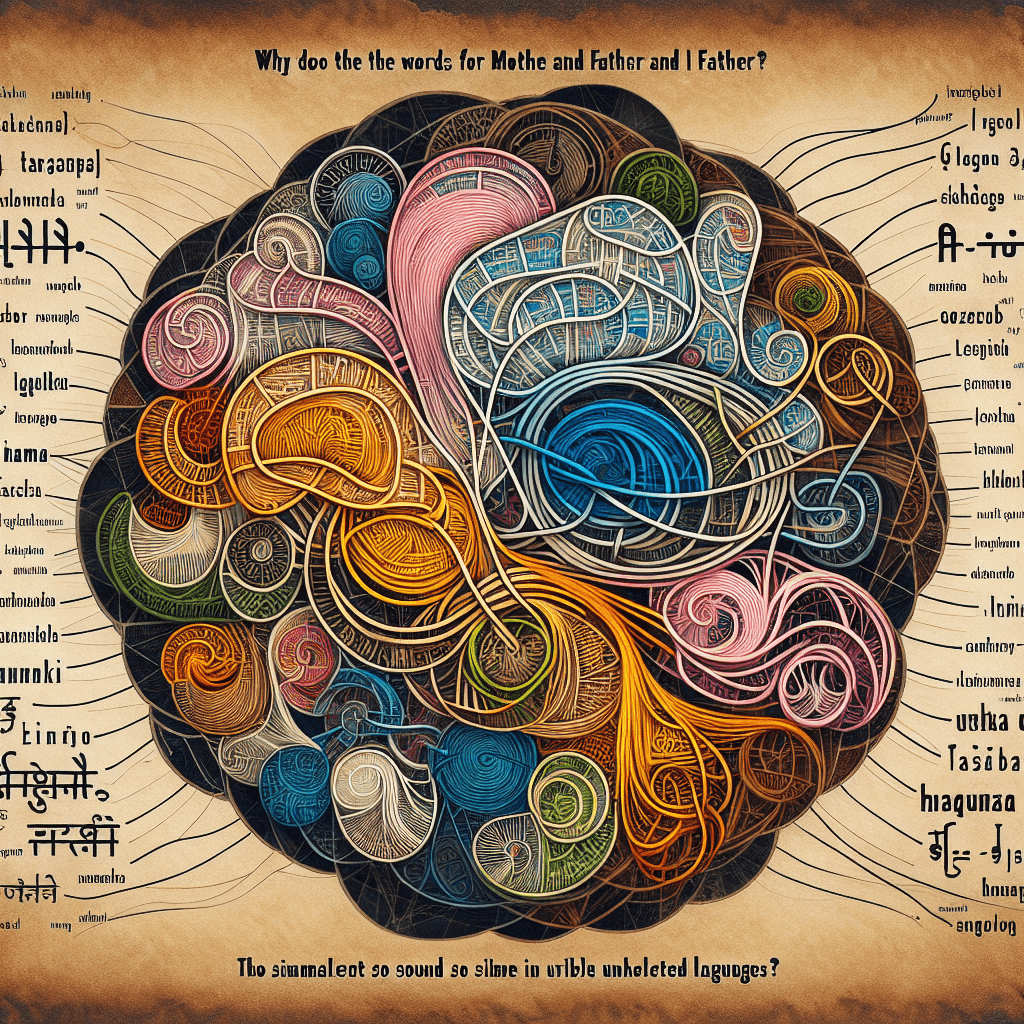Why do the words for mother and father sound so similar in unrelated languages
It’s not the world’s biggest coincidence that the words for "mama" and "papa" are universal; it’s because our babies taught these words to us, not the other way around.


Too Long; Didn't Read
TLDR: Words for mother and father sound similar across languages not due to a common root, but because sounds like ma, pa, and da are the easiest and first sounds babies make. Parents hear this babbling, assign meaning to it, and the words arise independently all over the world.
Mama, Papa, Baba: Why Do the Words for Mother and Father Sound So Similar in Unrelated Languages?
Have you ever noticed that whether you’re in Beijing, Moscow, or Nairobi, the word for "mother" often starts with an "m" sound, and the word for "father" frequently uses a "p," "b," or "d" sound? This isn't a massive coincidence, nor is it proof of a single ancient global language. Instead, this remarkable linguistic pattern reveals a beautiful intersection of infant biology, developmental psychology, and the universal experience of parenthood. This post will explore the fascinating and scientifically-backed reasons why these fundamental words echo each other across continents and cultures, stemming from the very first sounds a human baby can make.
The Universal Language of Babbling
The origin of "mama" and "papa" isn't found in ancient dictionaries but in the babbling of babies. Long before they can form intentional words, infants go through a babbling stage where they experiment with sounds. The easiest sounds for them to produce are the ones that require the least effort.
Think about the mechanics of a baby’s mouth. The simplest way to make a sound is to open the mouth and let air flow, creating a vowel sound like "ah." The easiest consonants to pair with this vowel are labial consonants, which are made by simply closing and opening the lips. The most common labial sounds are /m/, /p/, and /b/.
This combination of an easy labial consonant and an open vowel naturally leads to repetitive sounds like "ma-ma-ma," "pa-pa-pa," and "ba-ba-ba." These aren't words; they are the universal, biological starting blocks of human speech.
Parents as Interpreters: Giving Meaning to the Sounds
A baby babbling "ma-ma-ma" has no idea what it means. They are simply exercising their vocal cords and enjoying the new sounds they can create. The magic happens when an eager parent hears this.
A mother, who is often the primary caregiver and the source of nourishment, hears "ma-ma" and understandably gets excited. She interprets this sound as being directed at her. Through positive reinforcement—hugs, smiles, and repeating the sound back ("Yes, I'm Mama!")—the baby begins to form an association. The random babble of "mama" slowly gets mapped onto the concept of "mother."
This process is a feedback loop:
- Baby makes an easy, random sound: "ma-ma-ma."
- Mother hears it and assigns it meaning, reinforcing it with affection.
- Baby learns that making this sound gets a positive response from a specific person.
- The sound solidifies into a meaningful word.
So, Why 'Mama' for Mother and 'Papa' for Father?
The distinction between the "m" sound for mothers and the "p" or "d" sounds for fathers was famously explored by the Russian-American linguist Roman Jakobson. He proposed a compelling theory rooted in the physiology of feeding.
-
The "M" Sound: The /m/ sound is a soft, nasal consonant. Babies can, and often do, produce this humming sound with a full mouth while nursing. This sound becomes intrinsically linked to the act of feeding, comfort, and the person providing it—overwhelmingly, the mother.
-
The "P/B/D" Sounds: In contrast, sounds like /p/, /b/, and /d/ are plosives. They require the baby to build up a small amount of air pressure behind the lips or tongue and then release it in a small burst. These sounds are acoustically distinct from the soft "m" and cannot be made while nursing. As they are one of the other simple sounds a baby makes, they are often assigned to the other prominent figure in their life, the father.
A Global Pattern with Local Flavors
This pattern of "mama/papa" is a stunning example of linguistic convergent evolution, where unrelated languages independently arrive at a similar solution due to shared biological and social pressures.
Here are just a few examples:
- Mother: Māma (Mandarin), Mama (Swahili, Polish, Russian), Amma (Tamil), Maa (Hindi).
- Father: Baba (Persian, Turkish, Swahili), Papa (French, Spanish), Pater (Latin, the root of the English father), Abba (Hebrew).
Of course, this is not a 100% universal rule. There are many languages with completely different words, such as Japanese (haha for mother, chichi for father). These exceptions don't disprove the theory but show that while biology provides a strong starting point, cultural and linguistic evolution ultimately shapes a language's vocabulary.
Conclusion
The reason the words for mother and father sound so similar across the globe is one of the most beautiful stories in linguistics. It’s not a mystery of ancient history but a testament to the shared human experience. These words are not taught so much as they are born from the universal babble of infants and lovingly interpreted by their parents. They are a powerful reminder that before we learn the complexities of grammar and vocabulary, our first "words" are shaped by the simple, profound connection between a child and their caregivers, a language that every parent instinctively understands.


